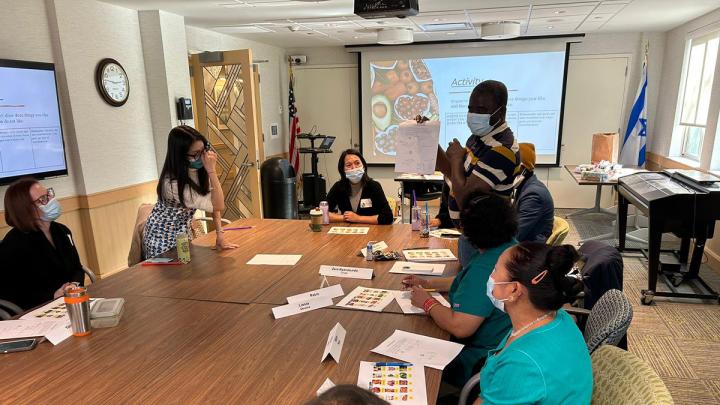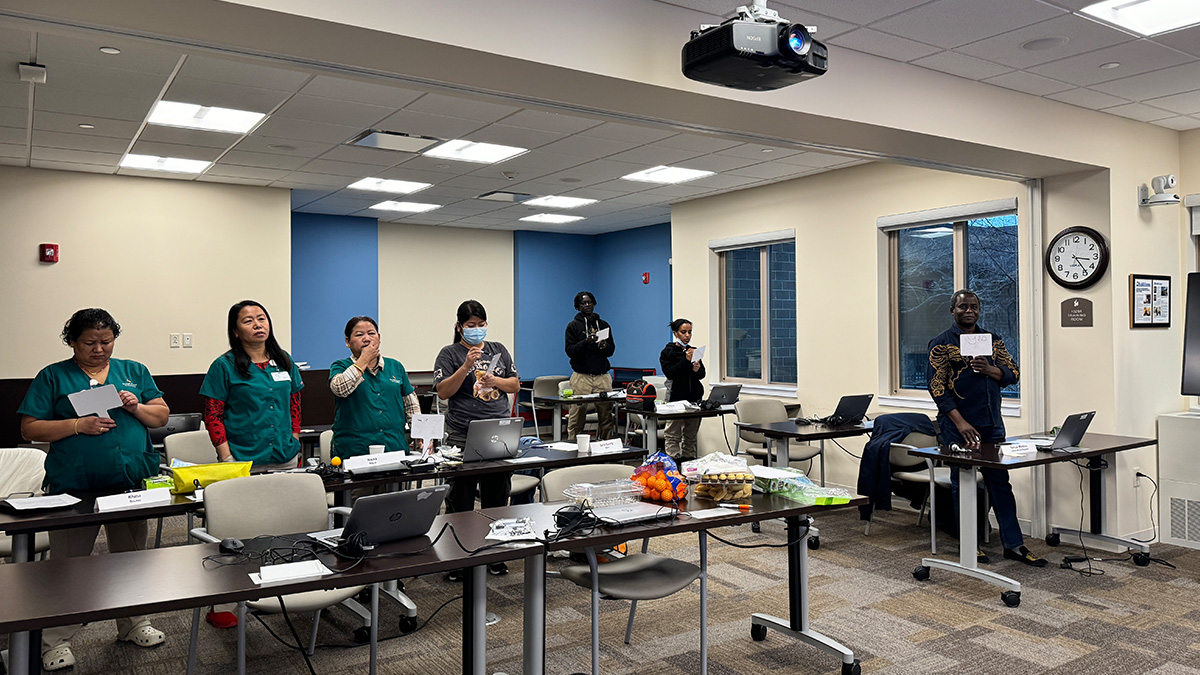Empowering immigrants and refugees: Program enhances language, health and employment equity

It’s one thing for an immigrant or refugee to learn how to read basic English. It’s quite another to know the language well enough to schedule a doctor’s appointment, understand health insurance information, or ask an employer for a sick day because of a sore throat.
So, for 20 weeks in 2023-24, on Tuesdays and Thursdays in The Learning Center at Jewish Senior Life in Brighton, adults from West Africa, Nepal, Bhutan, and other countries are taking part in a Warner School of Education program to become better at communicating basic yet critical information in English.
“These learners often have to leave their homeland because of natural disasters or the economy or some other difficult reason, and the fact that it’s hard to access English instruction often prevents them from finding a job and surviving in a foreign country,” says Yadi Zhang, a Warner doctoral student, English as a Second Language teacher and graduate assistant from Beijing.
The program is part of a hefty grant from the Mother Cabrini Health Foundation. The grant, executed with help from Warner School student volunteers and faculty in the Teaching English to Speakers of Other Languages (TESOL) and World Languages teacher preparation programs, emphasizes flexibility, cultural responsiveness and trauma-informed instruction.
On a recent Tuesday afternoon, the 90-minute class covered how to start a conversation if calling in sick to work.
One woman, pen poised in hand to take notes, reads a sentence on the screen perfectly: “I am afraid that I cannot come to work today.”
The other learners clap. Some cheer. For them, the support they give and receive is about much more than sentence structure and practical talking points.
“When refugees are abruptly forced to leave their country and come to one with a completely different language, their sense of confidence is crushed,” says Zachary Beheshti ‘23W (MS), a graduate of Warner's TESOL and Teaching Chinese as a Foreign Language programs and student advocate for the grant. “They go from being well-respected professionals in their community to all of a sudden not being able to express the most basic of requests. It’s like they have to start over, and that’s very tough.”
Beheshti recalls how exhausted he felt after a few hours of learning Ukrainian to connect with his English-Language Learner students.
“These people have to navigate a completely new environment—for their lives,” he says. “Giving them the ability to improve their self-confidence is truly an important task.”
That’s why other subjects covered in the program include gift-giving etiquette and other cultural expectations. These discussions allow learners to share their own customs while hearing about new ones.
When it comes to wedding gifts, for example, they discovered that in one country gifts often overflow rooms in a house, while in another there may be no gifts at all because visits with people are more revered than presents.
Humor plays a role in the program as well. When someone mentions the myth that storks deliver babies, one woman promptly proclaims, “I wish that were true,” and everyone laughs.
 Wanting to expand its scope by developing online materials, which include tutoring, the program has partnered with the Warner School’s Center for Learning in the Digital Age (LIDA).
Wanting to expand its scope by developing online materials, which include tutoring, the program has partnered with the Warner School’s Center for Learning in the Digital Age (LIDA).
Hairong Shang-Butler, an associate professor of teaching and curriculum at the Warner School who directs the International TESOL program and is the principal investigator of the grant, acts as a connector. As an affiliated faculty of LIDA, the immigrant from Hubei, China, shares news from the project, seeks suggestions regarding technical issues, and, with the Workplace English team, uses artificial intelligence tools to create short videos and online language games that combine language and content teaching.
Those videos are used with the group at Jewish Senior Life and other teaching sites, such as Special Touch Bakery in Rochester.
Aside from the fact that children absorb new material more quickly, adult learners in this setting are more challenging to work with because of their varied — and often difficult — backgrounds. While some had careers, others were illiterate. All have significant responsibilities.
“Kids don’t have worries about getting food and money for their families, and adults do,” says doctoral student Vanessa Medina, a program lead teacher. “Our learners are highly motivated and love to participate in class, but sometimes they have problems with their job or at home, and that makes them lose focus.”
To that point, sometimes learners are unable to attend class in person because of other responsibilities. As a result, they can either join the class remotely or watch a recorded class later.
 Medina says that she and her cohorts play numerous roles in helping immigrants and refugees get acclimated in successful ways. One master’s student is even helping an adult refugee earn a General Educational Development (GED) diploma online.
Medina says that she and her cohorts play numerous roles in helping immigrants and refugees get acclimated in successful ways. One master’s student is even helping an adult refugee earn a General Educational Development (GED) diploma online.
Adds Shang-Butler: “We also incorporate health concepts in our language classroom and design our lessons based on what we have observed in class. For example, many learners were telling us how stressed out and tired they were. Our team had a meeting and decided to design a class on mental health strategies and English related to that.”
The program expanded in fall 2023 to include three recipients of the Warner School’s Fulbright Distinguished Awards in Teaching Program for International Teachers, whose translation of educational materials was especially helpful given the wide range of English language fluency among learners. The Fulbright recipients — Khaoula Goumni, Alioune Samba, and Fatima Bellihi — also served as cultural ambassadors, attending classes at times to share traditions from their home countries.
“It was great to see how we can synergize multiple projects at Warner to serve the community,” says Shang-Butler, who also is a co-principal investigator for the Fulbright program.
The relationships that form as a result of such synergy reach far beyond the benefits of a supportive academic setting.
“It’s very moving when you talk to them because you realize we’re all the same,” Beheshti says. “We’re all human, and sometimes they just need someone to connect with. It doesn't solve everything, but it goes a long way.”